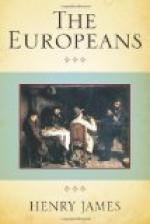The long rain had freshened the air, and twelve hours’ brilliant sunshine had dried the roads; so that the Baroness, in the late afternoon, proposing to walk to Mrs. Acton’s, exposed herself to no great discomfort. As with her charming undulating step she moved along the clean, grassy margin of the road, beneath the thickly-hanging boughs of the orchards, through the quiet of the hour and place and the rich maturity of the summer, she was even conscious of a sort of luxurious melancholy. The Baroness had the amiable weakness of attaching herself to places—even when she had begun with a little aversion; and now, with the prospect of departure, she felt tenderly toward this well-wooded corner of the Western world, where the sunsets were so beautiful and one’s ambitions were so pure. Mrs. Acton was able to receive her; but on entering this lady’s large, freshly-scented room the Baroness saw that she was looking very ill. She was wonderfully white and transparent, and, in her flowered arm-chair, she made no attempt to move. But she flushed a little—like a young girl, the Baroness thought—and she rested her clear, smiling eyes upon those of her visitor. Her voice was low and monotonous, like a voice that had never expressed any human passions.
“I have come to bid you good-by,” said Eugenia. “I shall soon be going away.”
“When are you going away?”
“Very soon—any day.”
“I am very sorry,” said Mrs. Acton. “I hoped you would stay—always.”
“Always?” Eugenia demanded.
“Well, I mean a long time,” said Mrs. Acton, in her sweet, feeble tone. “They tell me you are so comfortable—that you have got such a beautiful little house.”
Eugenia stared—that is, she smiled; she thought of her poor little chalet and she wondered whether her hostess were jesting. “Yes, my house is exquisite,” she said; “though not to be compared to yours.”
“And my son is so fond of going to see you,” Mrs. Acton added. “I am afraid my son will miss you.”
“Ah, dear madame,” said Eugenia, with a little laugh, “I can’t stay in America for your son!”
“Don’t you like America?”
The Baroness looked at the front of her dress. “If I liked it—that would not be staying for your son!”
Mrs. Acton gazed at her with her grave, tender eyes, as if she had not quite understood. The Baroness at last found something irritating in the sweet, soft stare of her hostess; and if one were not bound to be merciful to great invalids she would almost have taken the liberty of pronouncing her, mentally, a fool. “I am afraid, then, I shall never see you again,” said Mrs. Acton. “You know I am dying.”
“Ah, dear madame,” murmured Eugenia.
“I want to leave my children cheerful and happy. My daughter will probably marry her cousin.”
“Two such interesting young people,” said the Baroness, vaguely. She was not thinking of Clifford Wentworth.




